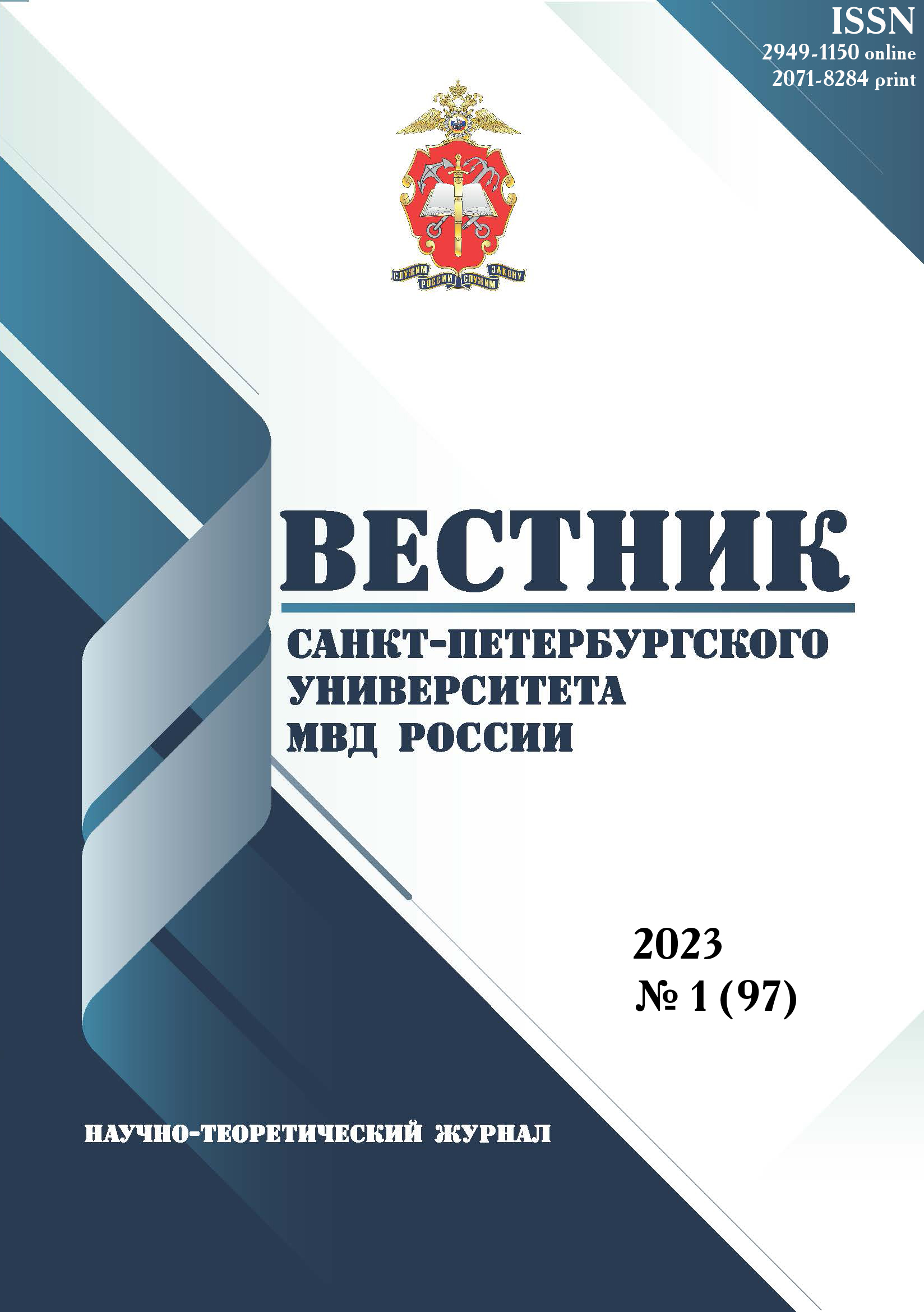from 01.01.2014 to 01.01.2022
Russian Federation
UDC 159.9.072.432
The aim of the research is to develop a methodology for studying the socio-psychological climate in teams of students of educational organisations of the Ministry of Internal Affairs of Russia. Theoretical grounds for the methodology were the ideas that the main structural elements that make up the socio-psychological climate in teams of students are: features of the organisation of educational and professional activities; features of the daily living, material and sanitary conditions in an educational organisation; nature of the relationship between students and teachers, students and officers, students’ relationships with each other; emotional and physical well-being of students; features of the organisation of extracurricular (scientific, sports and creative) activities; opportunities for meeting existential needs (in self-actualisation, self-development, etc.). These factors form the basis of the scales of the methodology being developed. The methodology also contains an overall scale that reflects the integral level of socio-psychological climate in a team. The points in the methodology are represented with statements and questions, asking respondents to answer them in a dichotomous way. Open-ended questions are also included to collect additional information. The processing of the results is limited to calculating the percentages of interviewees satisfied with the various aspects of the socio-psychological climate represented in separate scales of the methodology. On the basis of these data, a conclusion about the level of socio-psychological climate in the team is made. The climate can be satisfactory, unstable or unsatisfactory. The methodology is characterised by satisfactory values of discriminativeness, internal consistency reliability, construct validity and criterion validity. The procedure for collecting and processing the results is standardised.
socio-psychological climate, students, psychodiagnostic methodology, reliability, validity
1. Barsukova A. V., Zadvornaya V. V. Suschnost' social'no-psihologicheskogo klimata v organizacii i osnovy ego formirovaniya // Skif. Voprosy studencheskoy nauki. - 2019. - № 10 (38). - S. 310-321.
2. Gur'ev M. E. Analiz faktorov, vliyayuschih na formirovanie blagopriyatnogo social'no-psiologicheskogo klimata vnutrikollektivnyh otnosheniy // Novoe slovo v nauke i praktike: gipotezy i aprobaciya rezul'tatov issledovaniy. - 2015. - № 21. - S. 86-94.
3. Aprischenko L. I., Bezverhaya L. F. Aspekty formirovaniya social'no-psihologicheskogo klimata studencheskoy gruppy // Innovacionnoe razvitie. - 2019. - № 2 (29). - S. 92-93.
4. Kukulite T. G. Problema social'no-psihologicheskogo klimata v studencheskoy gruppe vuza // Uchenye zapiski Sankt-Peterburgskogo universiteta tehnologiy upravleniya i ekonomiki. - 2021. - № 1 (73). - S. 56-61.
5. Zapparov I. I., Mozhaev E. L. Snizhenie urovnya neyrotizma kak faktor formirovaniya blagopriyatnogo social'no-psihologicheskogo klimata v hokkeynoy komande 13-14 let // Obrazovatel'naya sreda segodnya: strategii razvitiya. - 2016. - № 1 (5). - S. 304-306.
6. Morinova T. P. Lyubitel'skiy horeograficheskiy kollektiv: problemy social'no-psihologicheskogo klimata // Trudy Sankt-Peterburgskogo instituta kul'tury. - 2020. - T. 221. - S. 53-58.
7. Sinicin S. V. Osobennosti social'no-psihologicheskogo klimata v kollektivah sotrudnikov organov vnutrennih del // Molodoy uchenyy. - 2019. - № 25 (263). - S. 85-87.
8. Schegoleva T. V. Osobennosti social'no-psihologicheskogo klimata v podrazdeleniyah s vysokim urovnem narusheniy sluzhebnoy discipliny // Psihopedagogika v pravoohranitel'nyh organah. - 2017. - № 1 (68). - S. 45-50.
9. Zueva O. V., Zorin A. V. Stil' upravleniya v organah vnutrennih del kak odin iz faktorov formirovaniya social'no-psihologicheskogo klimata sluzhebnogo kollektiva // Vestnik Maykopskogo gosudarstvennogo tehnologicheskogo universiteta. - 2021. - T. 13. - № 4. - S. 138-145. doi:https://doi.org/10.47370/2078-1024-2021-13-4-138-145.
10. Popov D. G. Moral'no-psihologicheskoe sostoyanie sotrudnikov i social'no-psihologicheskiy klimat sluzhebnogo kollektiva // Yuridicheskaya psihologiya. - 2009. - № 4. - S. 26-29.
11. Zapevalova O. V., Baburin V. V. Profilaktika konfliktnyh situaciy v sluzhebnom kollektive // Psihopedagogika v pravoohranitel'nyh organah. - 2018. - № 2 (73). - S. 30-34. doi:https://doi.org/10.24411/1999-6241-2018-12005.
12. Mihaylova T. V., Trubnikov O. V. Upravlencheskaya deyatel'nost' rukovoditelya territorial'nogo organa MVD Rossii v preduprezhdenii i razreshenii professional'nyh konfliktov // Prikladnaya psihologiya i pedagogika. - 2018. - T. 3. - № 3. - S. 33-42. doi:https://doi.org/10.12737/article_5b1ef539 2f6574.07715728.
13. Zarodina V. V. Social'no-psihologicheskiy klimat v organizacii i ego vliyanie na effektivnost' professional'noy deyatel'nosti // Molodoy uchenyy. - 2017. - № 2. - S. 696-698.
14. Vinogradov M. V., Ul'yanina O. A. Social'no-psihologicheskie problemy professional'nogo obrazovaniya sotrudnikov OVD // Vestnik Moskovskogo universiteta MVD Rossii. - 2020. - № 8. - S. 326-334. doi:https://doi.org/10.24411/2073-0454-2020-10505.
15. Bubnov A. L. Osobennosti social'no-psihologicheskogo klimata v kollektivah kursantov vuza sistemy MVD Rossii // Vestnik VGU. Seriya: problemy vysshego obrazovaniya. - 2020. - № 4. - S. 20-23.
16. Stepanova E. S., Raspopin E. V. Metodika izucheniya social'no-psihologicheskoy obstanovki v srede osuzhdennyh // Pravoohranitel'nye organy: teoriya i praktika. - 2017. - № 2. - S. 78-84.
17. Baturin N. A., Mel'nikova N. N. Tehnologiya razrabotki psihodiagnosticheskih metodik : monografiya. - Chelyabinsk: YuUrGU, 2012. - 135 s.
18. Fer Maykl R., Bakarak Vern R. Psihometrika: Vvedenie / per. s angl. A. S. Naumenko, A. Yu. Popova; pod red. N. A. Baturina, E. V. Eydmana. - Chelyabinsk: Izdatel'skiy centr YuUrGU, 2010. - 445 s.














